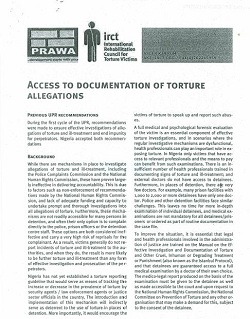November 2013
- Posting by PRAWA
- News

Access to Documentation of Torture Allegations – Background Overview
While there are mechanisms in place to investigate allegations of torture and ill-treatment, including the Police  Complaints Commission and the National Human Rights Commission, these have proven largely ineffective in delivering accountability. This is due to factors such as non-enforcement of recommendations made by the National Human Rights Commission, and lack of adequate funding and capacity to undertake prompt and thorough investigations into all allegations of torture.
Complaints Commission and the National Human Rights Commission, these have proven largely ineffective in delivering accountability. This is due to factors such as non-enforcement of recommendations made by the National Human Rights Commission, and lack of adequate funding and capacity to undertake prompt and thorough investigations into all allegations of torture.
Furthermore, these mechanisms are not readily accessible for many persons in detention, and often their only option is to complain directly to the police, prison officers or the detention centre staff.
These options are both considered ineffective and carry a very risk of reprisals for the complainant. As a result, victims generally do not report incidents of torture and ill-treatment to the authorities, and when they do, the result is more likely to be further torture and ill-treatment than any form of effective investigation and prosecution of the perpetrators.
Nigeria has not yet established a torture reporting guideline that would serve as means of tracking the increase or decrease in the prevalence of torture by security agents/ law enforcement agents or justice sector officials in the country. The introduction and implementation of this mechanism will indirectly serve as deterrent to the use of torture in places of detention. More importantly, it would encourage the victims of torture to speak up and report such abuses.
A full medical and psychological forensic evaluation of the victim is an essential component of effective torture investigations, and in scenarios where the regular investigative mechanisms are dysfunctional, health professionals can play an important role in exposing torture. In Nigeria only victims that have access to relevant professionals and the means to pay can benefit from such examinations.
There is an insufficient number of health professionals trained in documenting signs of torture and ill-treatment; and external doctors do not have access to detainees. Furthermore, in places of detention facilities with 1,000 to 2,000 or more detainees have only one doctor. Police and other detention facilities face similar challenges. This leaves no time for more in-depth examination of individual detainees, and medical examinations are not mandatory for all detainees/prisoners or ordered as part of routine documentation in the case file.
To improve the situation, it is essential that legal and health professionals involved in the administration of justice are trained on the Manual on the Effective Investigation and Documentation of Torture and Other Cruel, Inhuman or Degrading Treatment or Punishment (also known as the Istanbul Protocol), and that detainees are guaranteed access to a full medical examination by a doctor of their own choice. The medico-legal report produced on the basis of the examination must be given to the detainee as well as made accessible to the court and upon request to the National Human Rights Commission, the National Committee on Prevention of Torture and any other organization that may make a demand for this, subject to the consent of the detainee.
To download the full Fact sheets (8.1mb, PDF) PRAWA/IRCT Fact Sheet
